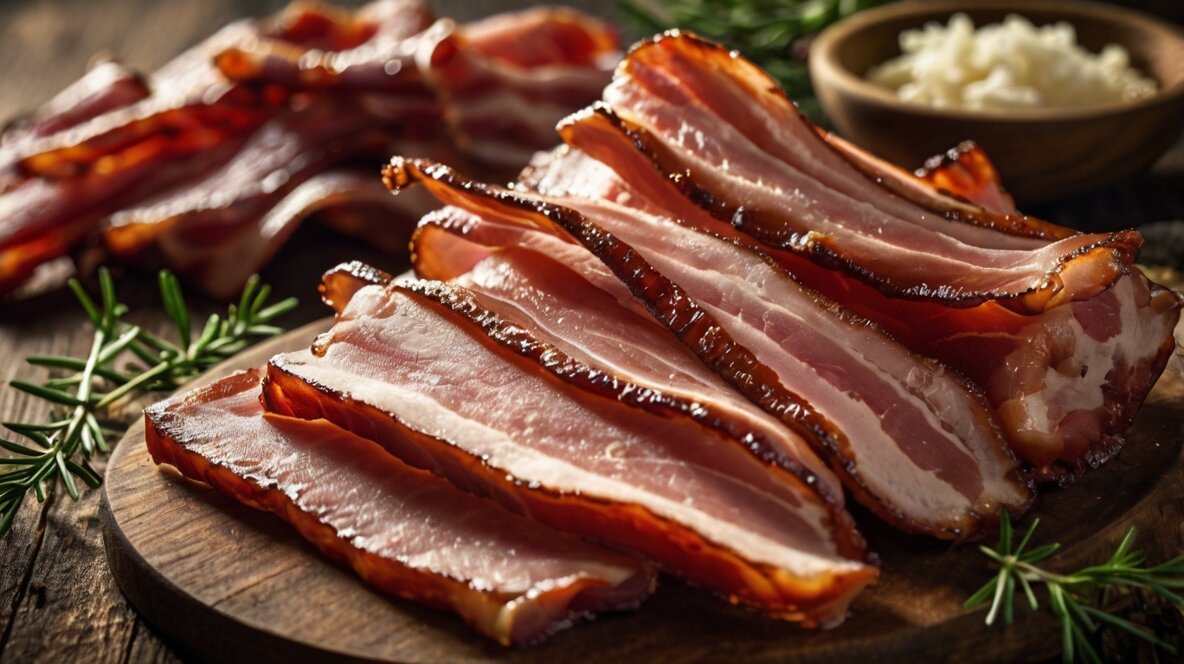Table of Contents
Introduction: Can Cats Eat Bacon?
Bacon is a tasty treat for humans, but can cats eat bacon? While bacon might seem like a harmless snack to share with your feline friend, there are both benefits and risks involved in feeding bacon to cats. In this article, we’ll explore whether cats should eat bacon, the potential health risks, and some healthier alternatives.
Is Bacon Safe for Cats?
Cats are obligate carnivores, meaning they thrive on a meat-based diet. While bacon is technically meat, it comes with its own set of concerns when offered to cats. Can cats eat bacon safely? The answer is yes, but only in small amounts and on rare occasions. However, bacon is high in fat, salt, and preservatives, which can lead to health issues if fed regularly.
Risks of Feeding Bacon to Cats
Although cats eat bacon, it’s important to understand the risks. Why is bacon bad for cats? Here are a few key reasons:
- High in Fat: Bacon contains large amounts of fat, which can lead to obesity and pancreatitis in cats. Fatty foods are also hard for cats to digest and can cause stomach upset.
- Too Much Salt: Bacon is loaded with salt, and cats have a much lower tolerance for sodium than humans. Excessive salt intake can lead to dehydration, high blood pressure, and kidney problems in cats.
- Preservatives and Additives: Most bacon is processed and cured with preservatives like nitrates and nitrites, which can be harmful to your cat’s health.
- Risk of Pancreatitis: The fat and salt content in bacon can trigger pancreatitis, a serious condition that inflames your cat’s pancreas and causes severe pain and illness.
Can Cats Have Raw Bacon?
Feeding raw bacon to your cat is not recommended. Is raw bacon safe for cats? The answer is no. Raw bacon carries the risk of bacterial contamination, such as salmonella or E. coli, which can cause foodborne illnesses. Always ensure that any meat you give to your cat is fully cooked and unseasoned.
What to Do if Your Cat Eats Bacon
If your cat accidentally consumes a small piece of bacon, there’s no need to panic. Monitor your cat for any signs of discomfort or illness, such as vomiting, diarrhea, or lethargy. What happens if cats eat bacon? In most cases, a small amount of bacon won’t cause immediate harm, but it’s important to avoid making it a regular treat.
Healthier Alternatives to Bacon for Cats
Instead of bacon, consider offering your cat healthier treats that suit their nutritional needs. What are some healthy treats for cats? Here are a few options:
- Cooked, Unseasoned Chicken: A lean and protein-rich alternative.
- Cooked Fish (like Salmon or Tuna): High in omega-3 fatty acids, great for your cat’s coat and overall health.
- Commercial Cat Treats: Specifically formulated to meet your cat’s dietary needs.
Conclusion: Should You Feed Bacon to Your Cat?
In summary, while cats eat bacon in minimal amounts, it’s not the healthiest choice for them. The risks of obesity, salt toxicity, and pancreatitis outweigh any potential benefits. Instead, stick to more nutritious, protein-rich treats designed for cats to keep your feline companion happy and healthy.
FAQs
Can Cats Eat Bacon Fat?
No, bacon fat should be avoided. The high-fat content can lead to obesity and digestive problems in cats.
Can Kittens Eat Bacon?
Kittens should not eat bacon. Their digestive systems are even more sensitive than adult cats, and bacon is too fatty and salty for them.
Can Cats Eat Turkey Bacon?
While turkey bacon is slightly leaner, it still contains high salt and preservatives, making it an unsuitable treat for cats.



